Maßgeschneiderte Materialien: Doktoratskolleg verlängert
Im Doktoratskolleg „Solids4Fun“ werden Materialeigenschaften erforscht, erklärt und verbessert. Der FWF verlängert das erfolgreiche Programm nun um vier Jahre.
Die Eigenschaften eines Materials werden nicht nur durch seine chemische Zusammensetzung festgelegt. Auch viele andere Parameter wie etwa seine Kristallstruktur oder seine Oberflächeneigenschaften können das Materialverhalten entscheidend beeinflussen. Seit vier J ahren läuft an der TU Wien das interdisziplinäre Doktoratskolleg „Solids4Fun. Arbeitsgruppen aus den Bereichen Chemie, Physik und Elektrotechnik haben sich in diesem Kolleg zusammengeschlossen und mit großem Erfolg gemeinsam geforscht. Nach einer erfolgreichen Beguta chtung durch den österreichischen Wissenschaftsfonds FWF wurde „Solids4Fun“ nun um vier Jahre verlängert. Damit erhalten 35 weitere Doktoratsstudierende die Chance auf eine erstklassige Forschungsausbildung.
Vielfältiges Forschungsprogramm
„Materials and Matter“ ist einer der fünf Forschungsschwerpunkte der TU Wien, genau für diesen Bereich leistet das Doktoratskolleg einen wichtigen Beitrag. „Wir vereinen Fachgebiete mit ganz unterschiedlichen Denkweisen und Fachsprachen, und das ist in der moderne n Materialwissenschaft sehr wichtig“, sagt Prof. Andrei Pimenov vom Institut für Festkörperphysik. Er ist nun in der Verlängerungsperiode Sprecher des Doktoratskollegs, in dieser Funktion löst er Prof. Ulrich Schubert (Institut für Materialchemie) ab, der das Kolleg bisher nach außen vertreten hat. „Bei uns bekommen die Studierenden einen breiten, interdisziplinären Überblick über den aktuellen Forschungsstand der Materialwissenschaft – das fehlt bei anderen, spezialisierteren Programmen oft“, sagt Pimenov.
(mehr)We welcome Hamad Bukhari
Hamad received an IRSIP (International Research Support Initiative) scholarship and will support our group till 08/30/2015.
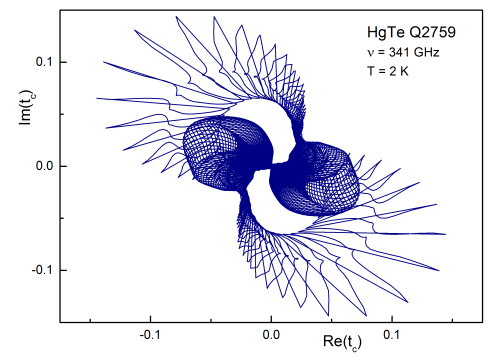
We welcome Dr. Enda Scally
Enda joined the group in the end of 2014. He holds a PhD in physics from the University College Dublin. His work was based on spectroscopic studies of laser produced plasmas (LPP) in the soft X-Ray and Extreme Ultraviolet (EUV) region using various atomic structure a
nd plasma dynamic codes. Experiments for improving broad-band and narrow-band emission in the soft X-Ray, EUV region using alloy and layer target geometries employing nano and pico-second laser systems. Work on renewable liquid collector optics in the EUV region and
development of a nano-second grazing incidence spectrometer.
FWF – postdoctoral and doctoral positions
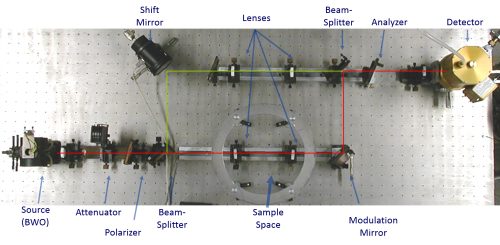
There is an opening for a doctoral position in our research group with a
new FWF project.
The aim of the project is the investigation and determination of the
origin of giant magnetoelectric effects in new magnetic and multiferroic
materials, using broadband dielectric (optical) spectroscopy. Applications
within other research topics of the group are possible as well.
Highly qualified and motived national and international students are
invited to apply.
Depending upon the qualifications, either doctoral or postdoctoral
position is possible.
Vienna is a fine location as regards culture and nature.
Please send an application to Andrei Pimenov
Röntgen Research Award
Dr. Alexey Shuvaev received the Röntgen-Wissenchaftspreis for his outstanding dissertation on "Spectroscopic study of manganites with magnetoelectric coupling" supervised by Prof. Dr. Andrei Pimenov
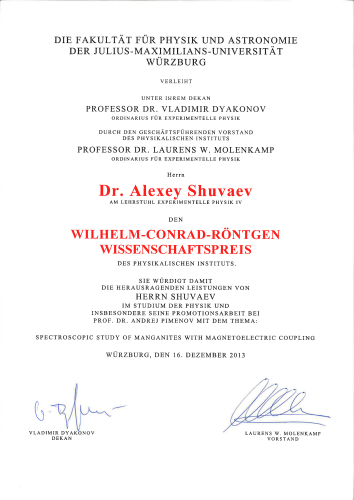
Dragonboat-Cup
On 03/07/2014 we have participated in the dragonboat-cup organised by the TU alumni club. We have assisted the team of the faculty of physics and gained the 10th place out of 16.
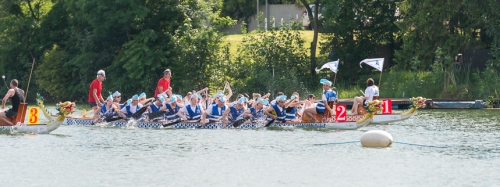
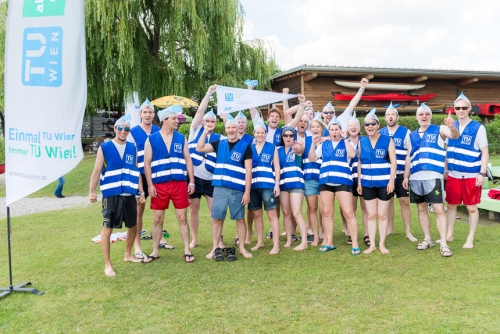
New Effect Couples Electricity and Magnetism in Materials
In magneto-electric materials, electric and magnetic vibrations can be coupled to “electromagnons”. High hopes are placed on this technology, a breakthrough could now be achieved at the Vienna University of Technology (TU Wien).
(read more)
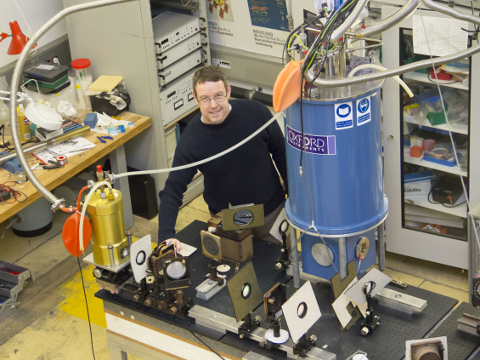
Successful PhD Thesis Defense
Congratulations to our group member and friend Sebastian Engelbrecht for successfully defending his PhD thesis, "Millimeter wave spectroscopy on metamaterials," supervised by Prof. Dr. A. Pimenov.
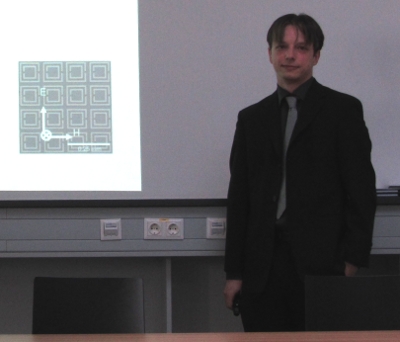
Successful PhD Thesis Defense
Congratulations to our group member and friend Alexey Shuvaev for successfully defending his PhD thesis, "Spectroscopic study of manganites with magnetoelectric coupling," with summa cum laude supervised by Prof. Dr. A. Pimenov.
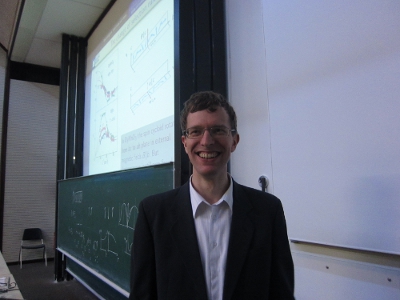
Breakthrough Light Transistor
Our group introduces a new methode to rotate the polarization direction of light simply by applying an electrical voltage to a specific material. This allows to build a transistor that works not with electricity but with light.
(read more)
(and read more)
(Article)
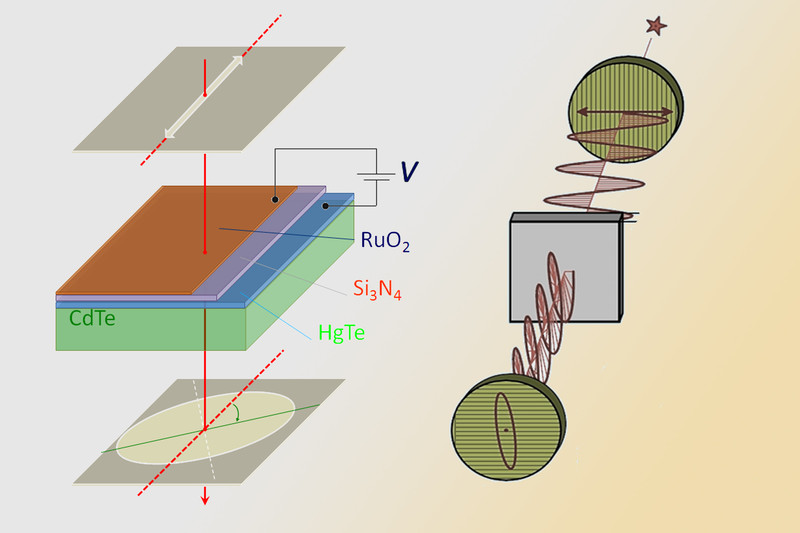
Left: The light beam (from above) is sent through a special material to which an electromagnetic potential is applied. That way, the polarization direction can be rotated.
Lake Shore Cryotronics Inc.
Our results are included in the broshure of Lake Shore Cryotronics Inc.

We welcome Dr. Elizabeth John
Elizabeth joined the group in April 2013. She did her masters in Physics
from Mahatma Gandhi University, Kerala, India followed by masters in
Education from University of Madras, Tamilnadu, India. Later did her
doctoral studies in Physics at Charles University, Prague, Czech Republic.
Her doctoral work was on the spectroscopic investigation of lattice
dynamics in multidomain ferroelectrics using Infrared and Raman
spectroscopy and PFM (Piezoresponse Force Microscopy) imaging.
We welcome Dr. Graeme Johnstone
Graeme joined the group in the beginning of 2013. He began his studies in physics at the University of St Andrews, then moved to the University of Oxford to study for his doctorate. At Oxford, his research was focused using both neutron and resonant x-ray scattering
to investigate magnetism in manganite materials such as colossal magnetoresistance manganites and multiferroics.
Wlad Dziom joins the group
We welcome Wlad Dziom into the group. Wlad studied physics at the famous Institute of Physics and Technology and did his master work at the Institute of Solid State Physics in Chernogolovka. His previous work is devoted to sensitive microwave experiments of supercond
uctors in external magnetic field. He will support our activities in terahertz spectroscopy.
Doktoratskolleg
In der Dezember-Sitzung hat das Kuratorium des FWF die Förderung des
interdisziplinären TU-Doktoratskollegs SolidFun mit 2,9 Millionen Euro
beschlossen. Der formelle Start erfolgt mit 1. März 2012 für die Vorbereitung,
das Ausbildungsprogramm startet mit dem Wintersemester 2012/13.
mehr
Licht im Rückwärtsgang
Was man sonst mit komplizierten Meta-Materialien zu erreichen versucht,
gelang an der Technischen Universität (TU) Wien nun mit ganz gewöhnlichen
Metallen: Eine negative Brechzahl lässt Lichtstrahlen „falsch herum“ abbiegen.
mehr
Optical transistors
An inteview was given by A. Pimenov in the public broadcast Ö1 - Wissen Aktuell on April, 8th. He reports on a material showing a colossal
Faraday effect. This discovery may enable the development of optical transistor elements, which are the building blocks of a future technology.
more
The broadcast with the inteview can be downloaded here.

